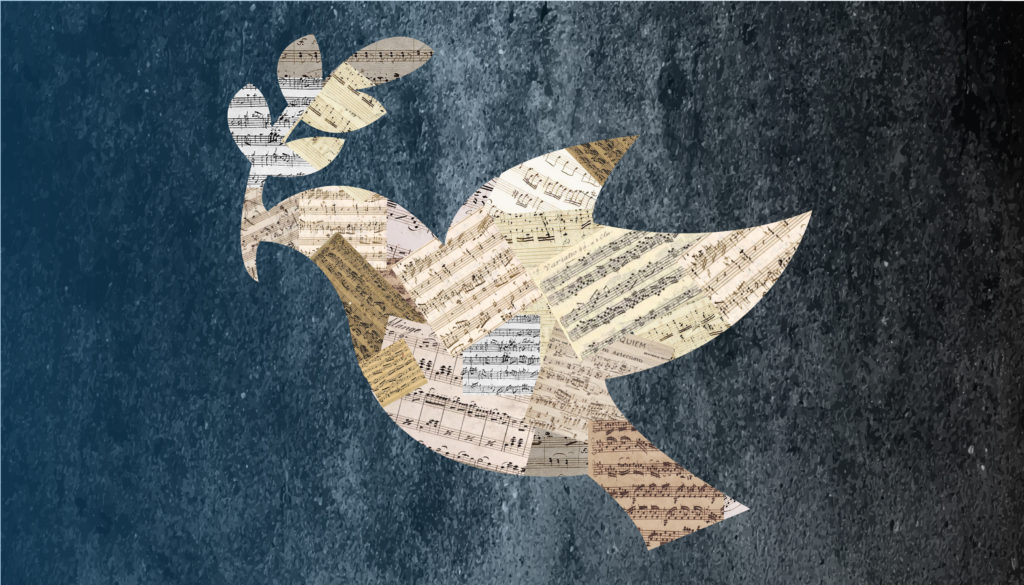
From vocal imitations of the sounds of combat in 16th century madrigal battaglias, to the sweeping music of Wagner’s Valkyries deciding the fates of warriors below, classical music has long been inspired by conflict, wartime triumphs, and military prowess.
But as today marks the International Day of Peace, a United Nations-sanctioned holiday dedicated to the absence of war and conflict, we’re shining a light on classical music penned by pacifist composers and work inspired by notions of peace.
Frank Bridge: Piano Sonata, H. 160 (1921-1924)
Bridge’s Piano Sonata marked a major shift in style for the English composer, who until that point had mostly written lighter, more accessible fare. The extended harmony and turbulent energy of the sonata might not denote peace in the traditional sense, but it was the trauma of WWI that prompted Bridge, an ardent pacifist, to compose what he saw as more meaningful work. The sonata was dedicated to Ernest Farrar, a young composer who lost his life in the war. Bridge died in 1941, before he saw his country prevail over Germany in the next world war, but not before he passed along pacifist ideals to his most famous student, Benjamin Britten.
Benjamin Britten: War Requiem, Op. 66 (1961-2)
Like his teacher before him, Britten dedicated his massive War Requiem to the memory of four friends who were victims of WWII. The work intersperses traditional requiem Latin texts with the words of Wilfred Owen, a WWI poet-soldier who wrote about the horrors of war. The Requiem wasn’t Britten’s first — or last — composition to urge the need for peace. As a long-time pacifist and conscientious objector, he had written music in the 1930s for the Peace Pledge Union, and continued expressing his peaceful ideals through music well into 60s and early 70s.
Johann Sebastian Bach: Agnus Dei: Dona nobis pacem from Mass in B minor, BWV 232 (1749)
Latin for “grant us peace,” the text dona nobis pacem traditionally appears in the Agnus Dei section of the Roman Catholic mass ordinary. Music scholars still aren’t certain what prompted Bach, a Lutheran protestant, to write a full-fledged setting of the Catholic Mass, but today it’s considered by many to be a pinnacle of classical music. The Mass was among Bach’s final compositions, and the Dona nobis pacem, a fugue that begins like a prayer, rises steadily to end the work in triumph.
Michael Tippett: A Child of Our Time (1939-41)
When war was declared on September 3rd, 1939, Michael Tippett began work on a new oratorio that very day. A Child of Our Time was his response to the facism gripping Europe during WWII, but by intersecting his own libretto with selections from James Weldon Johnson’s Book of American Negro Spirituals, Tippett created a timeless statement about persecution, racism, and injustice. In 1943, he was jailed for several months as a conscientious objector. In 1966, he was awarded knighthood. Above is the opening of A Child of Our Time, performed at the 2016 BBC Proms.
Philip Glass: Satyagraha (1980)
https://www.youtube.com/watch?v=lxGCwSD4Gj8
The second in Glass’s trio of operas dedicated to men that changed the world, Satyagraha centers on the early life of Mahatma Gandhi. The title of the opera is a Sanskrit word that Ghandi coined in reference to his practice of non-violent protest, and the libretto, derived from the Bhagavad Gita, is performed in original Sanskrit.
This clip comes from a 2011 production at the Metropolitan Opera, and includes the casting of a white tenor (Richard Croft) as Ghandi — a notable choice given recent critical backlash regarding whitewashing in opera.
Joesph Haydn: Mass in Time of War (1796)
https://www.youtube.com/watch?v=Zr5FS_xWh80
Haydn penned this mass setting as Austria was mobilizing for war against Napoleon’s troops. While Haydn never explicitly expressed anti-war sentiments regarding the work, listeners and music scholars have drawn such conclusions, largely because of an agitated nature in the music that was unusual for the composer.
A notable performance of the mass, conducted by Leonard Bernstein, took place in 1973 at an event called “A Plea For Peace.” Organized as an expression of “anguish” over the Vietnam War, the concert was programmed to coincide on the same night as the Inaugural Concert at Kennedy Center in Washington. There, the Philadelphia Orchastra was performing Tchaikovsky’s “1812 Overture,” which festively celebrates — complete with a famous cannon fire finale — the Russian victory over the same tyrant that had agitated Haydn: Napoleon.
Above is a performance conducted by Bernstein later in his career. The particularly stirring (and peace-oriented) Agnus Dei begins around 39:30.
Tune in to 91Classical to hear more programming for this year’s International Day of Peace:
- “Venus, The Bringer of Peace” from Gustav Holst’s The Planets at 8:33am
- The Fisk Jubilee Singers performing “We Shall Walk Through the Valley in Peace” for our Lunchtime Local feature at 12:06pm
- Two selections from Stewart Grant’s A Seder for Peace at 3:06pm
- The final movement from Beethoven’s Symphony No. 9 in d minor, Op. 125 at 6:32pm